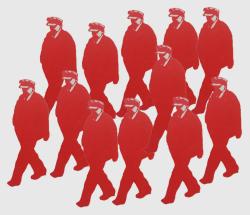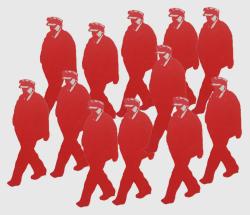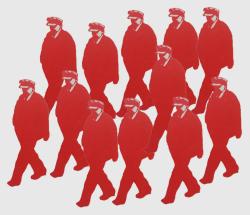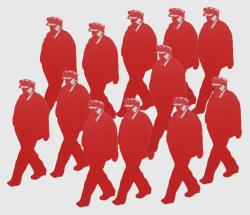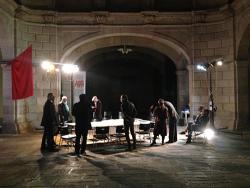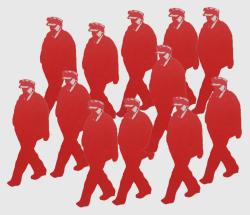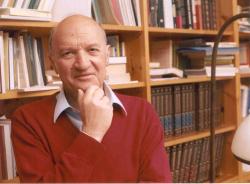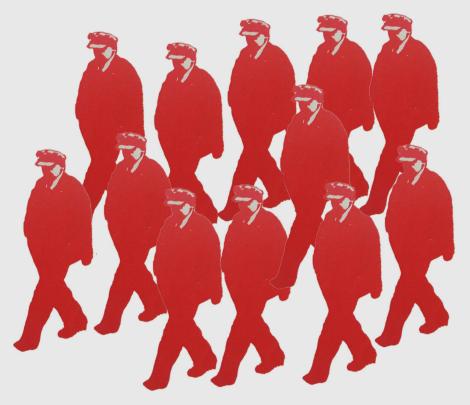Intervention 1917. The Year We Really Made the Revolution
07.11.2017 – 17.11.2017
7th, 8th, 9th, 14th, 15th, 16th and 17th November. Virreina LAB and Espai 4
Free entrance. Limited places
Tuesday 7th November. 7 pm, Virreina LAB
TodoaZen and Konkret
ONLY THE REVOLUTION IS REVOLUTIONARY (Theatre)
A free recreation of the night before the armed uprising of October 1917 against the Kerensky government. The discussions between Lenin, Kamenev, Trotsky, Kollontay, Stalin and other Bolsheviks reveal the tensions, doubts and certainties regarding an action that compromises plans for the Russian revolution begun in February of that year. The production combines the techniques of dramatic theatre and other contemporary types of performance.
Colectivo TodoaZen is a plural, multidisciplinary group whose work centres on the field of narrative research (though it doesn’t turn its nose up at poetry, non-fiction or drama either). It has worked in the field of narrative with El año que tampoco hicimos la Revolución (‘The Year we didn’t Make Revolution Either’), Caballo de Troya, 2009).
http://colectivotodoazen.blogspot.com.es/
Colectivo Konkret is a political theatre group that emerged within the Unidad de Producción Alcores in 1995. With more than 80 productions staged, it pays special attention to postdramatic interventions (invisible theatre, forum theatre) and avant-garde critical drama, researching into forms of acting with neighbourhood groups, women’s groups and political collectives.
Tuesday 7th November. 8 pm CANCELLED
THE DEMONSTRATION (Performance)
A demonstration made up of 100 people singing The International marches from Passeig de Colom to the Palau de la Virreina. Among their demands, some of the demonstrators are carrying posters of the Russian revolution, and others, of our own day. The demonstration is joined by the actors in the piece just as it ends and together they continue to Plaça de Catalunya.
Wednesday 8th November. 7 pm, Espai 4
A MIDWINTER NIGHT’S DREAM (Talk)
Domenico Losurdo
Thursday 9 November. 7 pm, Virreina LAB
LOST DREAMS (Discussion)
Chaired by Pascual Serrano, with Josep Ramoneda, Iván de la Nuez and Gregorio Morán.
Whether from circumstances arising from the struggle against Franco or else because they felt it was the only discourse that could put an end to the catastrophic situation generated by capitalism, many men and women pinned their hopes for a transformation of the world on the idea of communism and the revolutions it gave rise to. The clash with their own social class origins or the knowledge of the way some communist revolutions had gone led many communists to leave the parties they belonged to and take up sceptical or directly anti-communist positions. Here we debate the reasons for and the consequences of these conflicts that changed many people’s personal trajectories.
Tuesday 14th November. 7 pm, Virreina LAB
THE BIRTH OF ANTI-COMMUNISM (Discussion)
Chaired by Ángeles Diez, with Nines Maestro, Mirta Núñez and Guillem Martínez.
Since the publication of the Manifesto of the Communist Party, written by Karl Marx and Friedrich Engels, pamphlets and writings against the communist idea were a constant. Originally coming from conservative bourgeois intellectuals and the Church, in the 1920s and 1950s they had support from state organisations specially created to slander, deceive, distort and manipulate any information about the development of communism in the USSR, Cuba, Indonesia and other parts of the world. Here we debate on the forms used, the resources that were available and the proposals used that have come down to our day.
Wednesday 15th November. 7 pm, Virreina LAB
A MILITANT EDUCATION (Discussion)
Chaired by Salvador López Arnal, with Sira Rego and Ruth Morales.
Communist activism is tough and demanding and has generally affected family relations, in some cases leading children to reject it and in others, on the other hand, providing a lesson and an example to follow. Learning from parents and relatives means incorporating a powerful baggage from other times and other experiences, which, in their own activism, is enlarged with new knowledge from other sources and relations, more closely tied to present-day processes. Here we debate the problems and solutions facing people who have had communist relations.
Thursday 16th November. 7 pm, Virreina LAB
REVOLUTIONARIES FOR THE 21st CENTURY (Discussion)
Chaired by Constantino Bértolo, with Ester Vivas and Álvaro Aguilera.
Following the breakup of the USSR and the collapse of what was known as the Eastern Bloc, those countries and regions where the communist idea persisted have been reduced to marginal status. The expectations of so-called ‘21st-century socialism’ in Latin America, along with the discussions and books which for some decades have centred on the continuing need for communism as a project for social transformation, have opened up new horizons that materialise in a variety of political discourses and social movements. Here we debate what outlooks young communist activists see in the face of the restructuring of capitalism.
Friday 17th November. 7 pm, Virreina LAB
THE COMING REVOLUTION (Discussion)
Discussion chaired by Belén Gopegui, with Rita Maestre and Jon E.Illescas
Social conflicts arise determined by specific historical contingencies. No revolution is like any before it and new social conditions and new antagonisms have to be taken into account so as to point out the new paths taking shape in forthcoming communist revolutionary processes. Here we debate on the outlooks, needs and strategies that could declare the definitive collapse of capitalism.
Domenico Losurdo is professor of History of Philosophy at the University of Urbino (Italy). He has been director of the Internationale Gesellschaft Hegel-Marx für dialektisches Denken since 1988 and he is a founding member of the Associazione Marx XXIesimo secolo. His books notably include Stalin. Storia e critica di una leggenda nera (Stalin: History and Critique of a Black Legend) (2008) and Class Struggle: A Political and Philosophical History (2016[PT1] ).
Conversation with Víctor Ríos: https://www.youtube.com/watch?v=VKKsOBI-AOM
Presentation of La sinistra assente (The Absent Left): https://www.youtube.com/watch?v=r036M6pRrzI
Pascual Serrano graduated in Journalism from the Complutense University of Madrid in 1993. He started his career at the Spanish newspaper ABC. In 1996 he founded, together with a group of journalists, the electronic publication Rebelión (www.rebelion.org), which today functions as an alternative digital newspaper. Some of his most noteworthy books are Desinformación (Misinformation) (2013), La prensa ha muerto. ¡Viva la prensa! (The Press Is Dead; Long Live the Press!) (2014) and Medios democráticos (Democratic Media) (2016).
http://pascualserrano.net/es/
Josep Ramoneda taught Contemporary Philosophy at the Autonomous University of Barcelona from 1975 to 1990, directed the Institute of Humanities from 1986 to 1989, and directed the Barcelona Centre for Contemporary Culture from its foundation in 1994 to 2011. He has published a number of books, notably including Apología del presente (In Defence of the Present) (Ediciones Península, Barcelona 1989), Después de la pasión política (After Political Passion) (Taurus, Madrid 1999) and La izquierda necesaria (The Necessary Left) (RBA Libros, Barcelona 2012). He coordinates the magazine La Maleta de Portbou.
http://lamaletadeportbou.com/articulos/miradas-la-revolucion-rusa/
Iván de la Nuez is an essayist, art critic and curator. His books include La balsa perpetua (The Perpetual Raft) (1998), Playas (Beaches) (2000), El mapa de sal (The Salt Map) (2001), Fantasía Roja (Red Fantasy) (2006), honourable mention in the City of Barcelona Awards, Postcapital. Crítica del futuro (Postcapital: Critique of the Future) (2006), Inundaciones. Del Muro a Guantánamo: invasiones artísticas en las fronteras políticas. 1989-2009 (Floods. From the Wall to Guantanamo: Artistic Invasions in Political Borders. 1989-2009) (2010) and El comunista manifiesto (The Manifest Communist) (2013). http://www.ivandelanuez.org/
Gregorio Morán studied at the School of Dramatic Art in Madrid. There he first came into contact with youth workers’ movements, in the neighbourhood of Pozo del Tío Raimundo. He became involved in the anti-Franco opposition, as a member of the Communist Party of Spain (PCE), and went into exile in Paris in 1968, where he contributed to the publication Mundo Obrero. He left the PCE at the end of 1976. In 1988 he started to write in La Vanguardia. His books include: Miseria y grandeza del Partido Comunista de España 1939-1985 (Pettiness and Grandeur of the Communist Party of Spain 1939-1985) (1986), El precio de la transición (The Price of the Transition) (1991), El maestro en el erial: Ortega y Gasset y la cultura del franquismo (Master in the Wasteland: Ortega y Gasset and the Culture of Francoism) (1998), Asombro y búsqueda de Rafael Barrett (Wonder and Insight of Rafael Barrett) (2007) and El cura y los mandarines (The Priest and the Mandarins) (2014).
Interview on “Otra vuelta de Tuerka” https://www.youtube.com/watch?v=L4se53T1cno
Ángeles Diez is a professor of the Department of Social Change, in the Faculty of Political Sciences at the Complutense University of Madrid (UCM). She did her PhD within the contemporary Latin America programme of the Ortega y Gasset Institute at UCM. She coordinates the Cinema and Politics Area of the Complutense Institute of Administrative Sciences (ICCA). She is a member of the association of documentary makers DOCMA.
Nines Maestro is a doctor and senior public health officer. She studied Public Health at the Higher Institute of Medical Sciences in Havana (Cuba). She was a member of the Communist Party of Spain from 1973 to 2005. She stood for the European Parliament on the Internationalist Initiative ticket in 2009. She is currently a member of the communist organisation Red Roja (Red Network).
www.redroja.net
Mirta Núñez graduated from the Faculty of Information Sciences of the Complutense University of Madrid in 1983, with a dissertation on “The press of the International Brigades”. In October 1988 she defended her PhD thesis on “The war press in the Republican zone during the Spanish Civil War (1936-1939)”, supervised by José Altabella Hernández. Other works of hers include Los años del terror. La estrategia de dominio y represión del general Franco (The Years of Terror: General Franco’s Strategy of Dominance and Repression) (2004) and La disciplina de la conciencia: las Brigadas Internacionales (The Discipline of the Conscience: The International Brigades) (2006).
https://www.ucm.es/hcs/directorio/?id=3315
Salvador López Arnal is a professor and Tutor of Mathematics at the National Distance Education University (UNED) and information technology teacher for vocational training at Puig Castellar Secondary School in Santa Coloma de Gramenet (Barcelona). He is a regular contributor to the pages of El Viejo Topo, Rebelión, Espai Marx and Sin Permiso. He is a member of the trade union Workers’ Commissions. He is a disciple of Manuel Sacristán and Francisco Fernández Buey.
Sira Rego is head of Strategies for Conflict in United Left. Deputy Mayor of Rivas Vaciamadrid. She has a Degree in Nutrition, and is a member of the Communist Party of Spain, the trade union Workers’ Commissions and Ecologists in Action.
Ruth Morales has a Degree in Geology from the Complutense University of Madrid. She is a member of the Communist Party of Spain. She participates actively in trade union conflicts and the workers’ movement, and also the 15M movement.
Constantino Bértolo has a Degree in Hispanic Philology from the Complutense University of Madrid. He worked for years as a literary critic in several publications, including the newspaper El País. He has also written in magazines such as El Urogallo and El Independiente. He has taught on the Master Programme in Publishing at Pompeu Fabra University in Barcelona, the Master Programme in Publishing at the University of Salamanca run in partnership with Santillana Group, and the Ibero-American Master Programme in Publishing. He has been the director of the publishing houses Debate and Caballo de Troya.http://www.cervantesvirtual.com/portales/editores_editoriales_iberoamericanos/738555_entrevista_a_constantino_bertolo/
Álvaro Aguilera studied Hispanic Philology and went on to graduate in 2005 from the Cinema and Audiovisual School of Madrid (ECAM), specialising in Scriptwriting. Since then he has combined scriptwriting (“Estados alterados”, La Sexta) with his work teaching cinema and literature in places such as the Cinema and TV School at San Antonio de los Baños in Cuba (as an assistant professor) and Creators’ Forum in Madrid. Plato de mal gusto (Dish of Bad Taste) is his first novel. He is secretary of the Communist Party of Spain in Madrid.
Belén Gopegui is a writer and communist militant, she is the author of the novels The Scale of Maps, Tocarnos la cara (Touching Our Faces) (1995) and La conquista del aire (The Conquest of the Air) (1998). She also wrote the scripts of the films Sleeping Luck and The Archimedes Principle, directed by Ángeles González-Sinde and Gerardo Herrero respectively. In 2001 she published Lo real (The Real), followed by El lado frío de la almohada (The Cold Side of the Pillow) (2004). More recent novels include El padre de Blancanieves (Snow White’s Father) (2007), Deseo de ser punk (Wanna Be a Punk) (2009), Acceso no autorizado (Unauthorised Access) (2011) and El comité de la noche (The Night Committee) (2014). In 2015 she published a compilation of articles and essays in Chile entitled Rompiendo algo (Breaking Something). Her latest novel is Quédate este día y esta noche conmigo (Stay with Me This Day and This Night).
Rita Maestre is a Spanish politician and activist, councillor in Madrid City Council, where she also performs the duties of spokesperson and Coordinator of the Governing Board and Relations with the Plenary Council. She belongs to the Citizens’ Council of the political party Podemos, where she is in charge of the Area of Municipalism.
Jon E. Illescas, also known by the pseudonym “Jon Juanma”, he has a PhD in Sociology and Communication and a Degree in Fine Art. He has written the books Nepal, la revolución desconocida (Nepal, the Unknown Revolution), published in 2012 by La Caída, and La Dictadura del videoclip. Industria musical y sueños prefabricados (The Dictatorship of the Music Video: The Music Industry and Prefab Dreams), published in 2015 by El Viejo Topo.
Guillem Martínez is a journalist and scriptwriter for television and is responsible for the TV3 programme Polònia. He contributes to the media, including El País newspaper and Interviú magazine, and currently writes for CTXT online newspaper. He edited the compilation of essays CT o la Cultura de la Transición (2012) and has written a number of books, notably Barcelona rebelde (2009), La canción del verano (2007) and Pásalo (2004).
Esther Vivas is a journalist specialising in political analysis, the food and agriculture model and motherhood. She holds a BA in Journalism and an MA in Sociology. She has written a dozen books on these issues. Her recent published works include El negocio de la comida. ¿Quién controla nuestra alimentación? (2014) and Sense por (2013). She writes regularly for El Periódiconewspaper, Público.es online newspaper and Opcions magazine. She participates in the television talk shows Més 324, 8 al dia, Los desayunos de TVE, Bàsics Betevé, Vespre 24 and on Euskal Telebista as well as the radio talk shows El món a RAC1 and El matí a Ràdio 4. She contributes to the cultural programme Àrtic on Betevé. She lectures on the Master’s Degree in Organic Farming taught at the University of Barcelona, the Master’s Degree in Development and Co-operation at Ramon Llull University and the Master’s Degree in International Conflict Communication at the Autonomous University of Barcelona. She is a member of the ATTAC Scientific Council and of the advisory council of Viento Sur magazine. She was awarded the 2015 Biocultura Prize for environmental journalism.
https://esthervivas.com/




